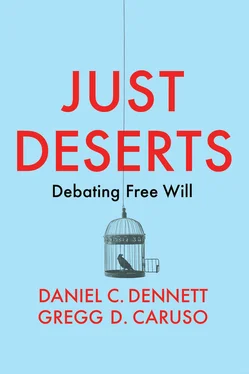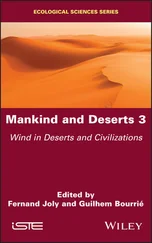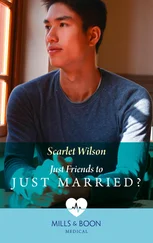1 Cover
2 Epigraph
3 Contributors
4 Title Page
5 Copyright
6 Foreword
7 Preface
8 Introduction List of Useful Definitions
9 Exchange 1 Debating Free Will and Moral Responsibility Coda: On Determinism
10 Exchange 2 Going Deeper: The Arguments The Arguments for Free Will Skepticism Debating the Manipulation Argument Debating the Charge of Instrumentalism Debating Luck (Again)
11 Exchange 3 Punishment, Morality, and Desert The Public Health–Quarantine Model Objections and Replies Punishment, Morality, and Deterrence Debating Desert and Compatibilism: One Final Time
12 References and Suggested Readings
13 Index
14 End User License Agreement
1 Cover
2 Table of Contents
3 Epigraph
4 Contributors
5 Title Page
6 Copyright
7 Foreword by Derk Pereboom
8 Preface
9 Introduction
10 Begin Reading
11 References and Suggested Readings
12 Index
13 End User License Agreement
1 a
2 b
3 c
4 iii
5 iv
6 vi
7 vii
8 viii
9 ix
10 x
11 1
12 2
13 3
14 4
15 5
16 6
17 7
18 9
19 10
20 11
21 12
22 13
23 14
24 15
25 16
26 17
27 18
28 19
29 20
30 21
31 22
32 23
33 24
34 25
35 26
36 27
37 28
38 29
39 30
40 31
41 32
42 33
43 34
44 35
45 36
46 37
47 38
48 39
49 40
50 41
51 42
52 43
53 44
54 45
55 46
56 47
57 48
58 49
59 50
60 51
61 52
62 53
63 54
64 55
65 56
66 57
67 58
68 59
69 60
70 61
71 62
72 63
73 64
74 65
75 66
76 67
77 68
78 69
79 70
80 71
81 72
82 73
83 74
84 75
85 76
86 77
87 78
88 79
89 80
90 81
91 82
92 83
93 84
94 85
95 86
96 87
97 88
98 89
99 90
100 91
101 92
102 93
103 94
104 95
105 96
106 97
107 98
108 99
109 100
110 101
111 102
112 103
113 104
114 105
115 106
116 107
117 108
118 109
119 110
120 111
121 112
122 113
123 114
124 115
125 116
126 117
127 118
128 119
129 120
130 121
131 122
132 123
133 124
134 125
135 126
136 127
137 128
138 129
139 130
140 131
141 132
142 133
143 134
144 135
145 136
146 137
147 138
148 139
149 140
150 141
151 142
152 143
153 144
154 145
155 146
156 147
157 148
158 149
159 150
160 151
161 152
162 153
163 154
164 155
165 156
166 157
167 158
168 159
169 160
170 161
171 162
172 163
173 164
174 165
175 166
176 167
177 168
178 169
179 170
180 171
181 172
182 173
183 174
184 175
185 176
186 177
187 178
188 179
189 180
190 181
191 182
192 183
193 184
194 185
195 186
196 187
197 188
198 189
199 190
200 191
201 192
202 193
203 194
204 195
205 196
206 197
207 198
208 199
209 200
210 201
211 202
212 203
213 204
214 205
215 206
216 207
217 208
218 209
219 210
220 211
221 212
222 213
223 214
224 215
225 216
226 217
227 218
228 219
229 220
230 221
231 222
232 223
233 224
“Just Deserts is a delight: a sharp and interesting discussion of punishment, morality, choice, and much else. It hits the sweet spot; it’s wonderfully clear and accessible – perfect for a newcomer to the free will debates – but also deep and subtle, with plenty to engage experts in the field.”
Paul Bloom, Brooks and Suzanne Ragen Professor of Psychology, Yale University, and author of Against Empathy
“What it means to make a choice, to deserve praise or blame, to do the right thing – these are all at stake in the debate over free will. Here you will find two different viewpoints, elaborated and defended by true masters. Given the sharpness of both interlocutors, neither has anywhere to hide; a wide spectrum of important points is laid out for careful consideration.”
Sean Carroll, author of The Big Picture: On the Origins of Life, Meaning, and the Universe Itself
“This is a very lively, engaging, and thoughtful debate between two well-informed and insightful philosophers. It is written in a very accessible style, and students and even scholars in other disciplines or sub-fields of philosophy will learn from it and find themselves drawn in. It does not just re-hash traditional debates, but pushes the frontiers outward. Highly recommended.”
John Martin Fischer, Distinguished Professor of Philosophy at UC Riverside
“A philosophical debate in the grand style. Caruso and Dennett play in the philosophical equivalent of a three set tennis championship where the prize is whether free will exists or not and what this means for reward, punishment, and the criminal law. Serve, volley, amazing gets, overheads, long rallies, a few trick shots, several match points. Really smart play from two philosophers at the top of their games.”
Owen Flanagan, James B. Duke Distinguished University Professor, Duke University
“ Just Deserts made me think philosophy should never be done alone, but with a partner of equal strength and opposing views, that the best of it should be made available to the public, and that it should leave readers with an appreciation of the depth and difficulty of the questions but no easy answers. It is a stirring discussion of a difficult issue, that distils the best of what has been said for both sides. I can think of no discussion of free will and desert that gets to the heart of the issues so effectively. It reminds you just how important and difficult and vitally alive philosophical debate can be.”
Jenann T. Ismael, Professor of Philosophy at Columbia University, and author of How Physics Makes Us Free
“This is a spirited and enlightening debate between an influential defender of compatibilism about freedom, responsibility, and determinism (Dennett) and an astute defender of a hard incompatibilist or free will skeptical position (Caruso). The book breaks new ground on many issues; and it has made clearer to me than anything else I have ever read on the subject how central is the issue of “just deserts” to age-old debates about free will, moral responsibility, and determinism.”
Robert Kane, University Distinguished Professor Emeritus of Philosophy and Law, University of Texas at Austin
Daniel C. Dennettis Co-Director of the Center for Cognitive Science and the Austin B. Fletcher Professor of Philosophy at Tufts University. His books include Content and Consciousness (1969), Brainstorm s (1978), Elbow Room (1984), The Intentional Stance (1987), Consciousness Explained (1991), Darwin’s Dangerous Idea (1995), Kinds of Minds (1996), Freedom Evolves (2003), Breaking the Spell (2006), and From Bacteria to Bach and Back: The Evolution of Minds (2017). He is a leading defender of compatibilism, the view that determinism can be reconciled with free will, and is perhaps best known in cognitive science for his concept of intentional systems and his multiple drafts model of human consciousness.
Читать дальше












